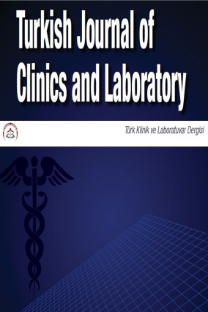Abdominal duvar endometriozisi; Retrospektif, gözlemsel bir çalışma
Endometriozis, karın duvarı, siklik ağrı, kitle
Abdominal wall endometriosis; A retrospective, observational study
Endometriosis, abdominal wall, cyclic pain, mass,
___
- 1. Nezhat FR, Shamshirsaz AA, Yildirim G. Pelvic pain, endometriosis, and the role of the gynecologist. Pediatric, Adolescent and Young Adult Gynecology. 1st ed. New Jersey: Wiley-Blackwell; 2009:174-94.
- 2. Alessandro P, Luigi N, Felice S, Maria PA, Benedetto MG, Stefano A. Research development of a new GnRH antagonist (Elagolix) for the treatment of endometriosis: A review of the literature. Arch Gynecol Obstet 2017; 295: 827-32.
- 3. Sarma D, terBrugge KG, Gentili F, Halliday W. Cerebellar Endometriosis. AJR Am J Roentgenol 2004; 182: 1543-6.
- 4. Huang H, Li C, Zarogoulidis P et al. Endometriosis of the lung: report of a case and liter- ature review. Eur J Med Res 2013; 18: 13.
- 5. Leite GKC, de Carvalho LFP, Korkes H et al. Scar endometrioma following obstetric surgical incisions: retrospective study on 33 cases and review of the literature. Sao Paulo Med J 2009; 127: 270–7.
- 6. Uçar MG, Şanlıkan F, Göçmen A. Surgical treatment of scar endometriosis following cesarean section, a series of 12 cases. Indian J Surg 2015; 77: 682–6.
- 7. Rindos NB, Mansuria S. Diagnosis and management of abdominal wall endometriosis: a systematic review and clinical recommendations. Obstet Gynecol Surv 2017; 72: 116-22.
- 8. Blanco RG, Parithivel VS, Shah AK, Gumbs MA, Schein M, Gerst PH. Abdominal wall endometriomas. Am J Surg 2003; 185: 596-8.
- 9. Chang Y, Tsai EM, Long CY, Chen YH, Kay N. Abdominal wall endometriomas. J Reprod Med 2009; 54: 155–9.
- 10. Horton JD, Dezee KJ, Ahnfeldt EP, Wagner M. Abdominal Wall endometriosis: A surgeon’s perspective and review of 445 cases. Am J Surg 2008; 196: 207-12.
- 11. Nominato NS, Prates LF, Lauar I, Morais J, Maia L, Geber S. Caesarean section greatly increases risk of scar endome- triosis. Eur J Obstet Gynecol Reprod Biol 2010; 152: 83–5.
- 12. Taburiaux L, Pluchino N, Petignat P, Wenger JM. Endometriosis-associated abdominal wall cancer: a poor prognosis? Int J Gynecol Cancer 2015; 25: 1633-8.
- 13. Ferrandina G, Palluzzi E, Fanfani F et al. Endometriosis-associated clear cell carcinoma arising in caesarean section scar: a case report and review of the literature. World J Surg Oncol 2016; 14: 300.
- 14. Modesitt SC, Tortolero-Luna G, Robinson JB, Gershenson DM, Wolf JK. Ovarian and extraovarian endometriosis- associated cancer. Obstet Gynecol 2002; 100: 788-95.
- 15. Khachani I, Filali Adib A, Bezad R. Cesarean scar endometriosis: An uncommon surgical complication on the rise? Case report and literature review. Case Rep Obstet Gynecol 2017; 80: 629-24.
- 16. Bektas H, Bilsel Y, Sari YS et al. Abdominal wall endo- metrioma; a 10-year experience and brief review of the literature. J Surg Res 2010; 164: e77–e81.
- 17. Fernandez-Acenero MJ, Cordova S. Cutaneous endome- triosis: review of 15 cases diagnosed at a single institution. Arch Gynecol Obstet 2011; 283: 1041–4.
- 18. Oh EM, Lee WS, Kang JM, Choi ST, Kim KK, Lee WK. A surgeon’s perspective of abdominal wall endometriosis at a caesarean section incision: Nine cases in a single institution. Surg Res Pract 2014; 2014: 765372.
- 19. Medeiros Fd, Cavalcante DI, Medeiros MA, Eleutério J Jr. Fine- needle aspiration cytology of scar endometriosis: Study of seven cases and literature review. Diagn Cytopathol 2011; 39: 18-21.
- 20. Savelli L, Manuzzi L, Donato ND et al. Endometriosis of the abdominal wall: ultrasonographic and doppler characteristics. Ultrasound Obstet Gynecol 2011; 10052: 132.
- 21. Song HK, Lee SH, Kim MJ, Shin JE, Lee DW, Lee HN. Abdominal wall mass suspected of endometriosis: clinical and pathologic features. Obstet Gynecol Sci 2020; 63: 357-62.
- 22. Patterson GK, Winburn GB. Abdominal wall endometriomas: Report of eight cases. Am Surg 1999; 65: 36-9.
- 23. Grigore M, Socolov D, Pavaleanu I, Scripcariu I, Grigore AM, Micu R. Abdominal wall endometriosis: an update in clinical, imagistic features, and management options. Med Ultrason 2017; 19: 430-7.
- 24. Purvis RS, Tyring SK. Cutaneous and subcutaneous endome- triosis. Surgical and hormonal therapy. J Derm Surg Oncol 1994; 20: 693-5.
- 25. Kim SM, Kim HK, Namkung J et al. A case of reconstruction of abdominal fascia using polypropylene mesh for patient of abdominal wall endometriosis after cesarean section. Korean J Obstet Gynecol 2012; 55: 517-21.
- 26. Khan Z, Zanfagnin V, El-Nashar SA, Famuyide AO, Daft- ary GS, Hopkins MR. Risk factors, clinical presentation, and outcomes for abdominal wall endometriosis. J Minim Invasive Gynecol 2017; 24: 478-84.
- ISSN: 2149-8296
- Yayın Aralığı: Yılda 4 Sayı
- Başlangıç: 2010
- Yayıncı: DNT Ortadoğu Yayıncılık AŞ
Serdar GÜNAYDIN, Kevin MCCUSKER, Chet CZAPLICKA, Ryan MCCUSKER
Periferik arter hastalığı tanısında yeni bir biyokimyasal gösterge olarak paraoksonaz 1 aktivitesi
Hasan Basri SAVAŞ, Mustafa ETLİ
Sağ sinüs valsalva kökenli sol koroner sistemin göğüs ağrısı ile prezentasyonu
Türkiye’de aromaterapinin etkisine yönelik yapılan hemşirelik tezlerinin incelenmesi
Didem ŞİMŞEK KÜÇÜKKELEPÇE, Zehra GÖLBAŞI, Murat ZOR
Lenfoproliferatif hastalıklarda splenektomi endikasyonları ve klinik sonuçlarımız
Ramazan SARI, Mehmet Zeki BULDANLI
Mahi Nur CERİT, Emetullah CİNDİL, Halit Nahit ŞENDUR
Deniz BOZDOGAN, Aytaç ÇALIŞKAN
Meme kanseri risk faktörleri belirlenmesi: Tek merkez deneyimi
Pınar AKHANLI, Sanem KAYHAN, Gökşen İNANÇ İMAMOĞLU, Özlem AYDIN İSAK, Sema HEPŞEN
